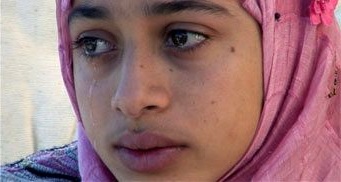Tears of Gaza -- Film Review
Kirk Honeycutt
The Hollywood Reporter

Bottom Line: A searing doc shows the appalling impact war has on the innocent. [Trailer HERE.]
TORONTO -- Vibeke Løkkeberg's "Tears of Gaza" raises the question: Can any filmmaker do a film about the Israeli-Palestinian conflict without antagonizing someone? Løkkeberg's film deals with the 2008-09 bombing of Gaza by the Israeli military. Her strategy is to focus on the horrific impact this has on civilians -- mostly women and children; in other words, how war affects the innocent. Løkkeberg, a Norwegian actress, author and filmmaker, has scrubbed away all context, political or otherwise. This could be any war descended on an urban population.
Soldiers expect death and destruction; they've trained for it. Civilians don't know how to react to dead children and bombed homes. "Where can I get forgiveness from?" moans a man who has lost a child.
"Gaza" is gut-wrenching to watch -- perhaps the ultimate anti-war film -- but will the word "Gaza" in the title stop people? Films, whether docs or features, don't generally talk about war from this perspective. Now we have a film that does, but Middle Eastern politics might contaminate it. The Arab world might embrace the film, especially coming from a Westerner, and Israel and its supporters might shun it. So a compelling film about war will not be as widely seen as it should.
The film opens in November in Norway and could get playdates elsewhere in Europe, but in North America, it undoubtedly will play only festivals. The response at those festivals will be interesting to watch.
On one hand, the film is pretty rough and disorganized, like war itself. Løkkeberg says she wants to view war through the stories of three young people, but these stories swiftly get lost.
A Palestinian boy stands at the seashore, recalling visits to the beach with his father, now dead, "murdered" as he puts it. Tears come to him. He says he wants to become a doctor so he can treat those injured by the Israelis.
Two other girls tell of their tragedies and injuries, too, but the film keeps cutting to footage shot by several Palestinian cameramen during the bombings. After years of deprivation and economic embargo, Gaza clearly lacks the infrastructure and resources to deal with the carnage.
Instead, neighbors bravely rush to fallen buildings emitting fire and smoke to rescue helpless victims. A pathetic hose makes do as few fire trucks exist. Broken and dead bodies are pulled from rubble. Children emerge with mangled limbs or holes in their heads. Sobbing women clutch their faces and beat their sides.
Cars are found to transport the wounded to overwhelmed hospitals. Phosphorous bombs shower people with tiny blobs of fire that ignite flesh.
A father cradles a young daughter who happily eats her food. Then he lifts her clothes to show the scarred flesh. In a hospital, the staff pulls up the clothes on children's corpses to show bullet wounds that come from close range. These children were executed, the staff insists, as the camera bears witness.
Back in the present, a bachelor party and then wedding doesn't lack for cheer, but the bridegroom feels sadness. His immediate family is all gone, and he is broke. On the day of his wedding, he sees no future for himself.
Children and a few adults tell their tales of terror to the camera. A woman looks for clothes to buy for her daughter at a street market but says the goods, which come through tunnels to Gaza, are too expensive.
It's not clear, but presumably Løkkeberg acquired the war footage while she shot the sequences in the aftermath, when things returned to "normal." Only there is no normal. Extreme trauma is in everyone's face. These are beaten, fatalistic, vengeful people. They curse their opponents, but even these curses ring hollow.
Løkkeberg eventually finds her way back to her protagonists as the film concludes. The boy repeats his desire to become a doctor, and a girl says she wants to become a lawyer to "defend my homeland."
The remainder of these lives will be lived in response to the bombings: the bridegroom without parents or money and the children who desire to somehow rescue their remaining relatives and neighbors from suffering. Wars have a way of never ending. This is the strongest single idea one takes away from the emotionally devastating "Gaza."
Venue: Toronto International Film Festival
Production: Nero AS
Director-screenwriter: Vibeke Løkkeberg
Producer: Terje Kristiansen
Directors of photography: Yosuf Abu Shreah, Saed Al Sabaa, Marie Kristiansen
Music: Lisa Gerrard, Marcello De Francisci
Editors: Svein Olav Sandem, Terje Kristiansen
Sales: AB Svensk Filmindustri
No rating, 85 minutes
___________________________________________________________________________________
AWIP: Tears Of Gaza (Gazas Tårer) - Trailer
___________________________________________________________________________________
URL: http://www.a-w-i-p.com/index.php/2010/09/22/tears-of-gaza-film-review
























